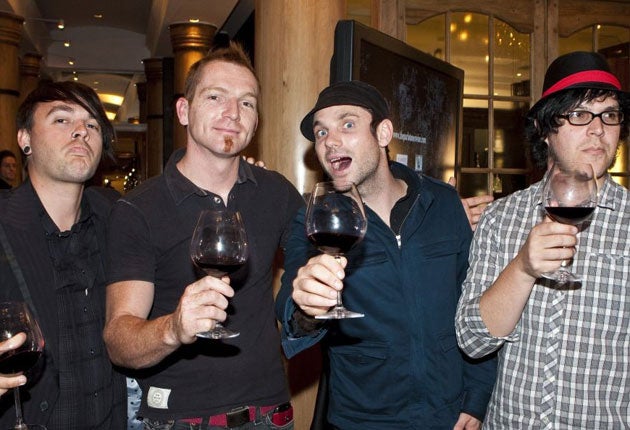Fancy a glass of Chateau Rock Star?
Forget sports cars and mansions. The ultimate status symbol for today's rockers is a private vineyard – and some of their wine is impressing experts. Rob Sharp finds out why music and viticulture make the perfect blend

Sting's is highly acidic and goes well with meatloaf. That belonging to Dave Matthews, the famous front-man of US middle-of-the-road rockers The Dave Matthews Band, is known for its subtlety and simplicity. The Parlotones, South Africa's answer to Coldplay, prefer something spicy, rich, plummy and fruity. They are all of a certain vintage, can oil the wheels of a slow-moving dinner party, and might possibly undermine your image among your friends.
Gone are the days when rock stars indulged in drug-fuelled orgies and beer-powered all-nighters. The tipple of choice for 21st-century musicians is grape-derived and is best served in a bulbous glass. From yoga-powered eco-philes to those filling stadiums in the curve of the Cape of Good Hope, pop stars are increasingly dabbling in viticulture. The artists listed above have all indulged in producing and selling their own wines. The Parlotones, who top the charts in their home country but are relatively anonymous here, hope that by selling their own red and white wines – encouragingly marketed under the brand name Giant Mistake – might even help introduce them to British audiences.
"The relationship between wine and music is a good marriage," says The Parlotones' lead singer Kahn Morbee. "There are a lot of similarities between making music and fermenting wine. Both of them have a definite science, for example. Certain chords work together and specific grape varieties taste good when combined. What you bring of yourself is what makes a song. With wine, it's all about your ability to tune in to your senses of taste and smell."
It seems a songsmith reaches a certain age – and either obsessed with environment, ethics, or a new-found appreciation of the finer things in life after years of slumming it on the road – bags themselves a vineyard. That was certainly the case with Matthews. In an interview with Food & Wine magazine in 2005, he remembered the early, relatively impoverished days of his career, when he could only dream of cushy futures with his friend Brad McCarthy (who is now the managing partner and winemaker at Blenheim, the vineyard Matthews owns just outside Charlottesville, Virginia). "Brad and I used to stuff bad pizza and bad beer down our throats and fix ourselves a Pepto-Bismol chase," he said. Even once his group began touring in the early 1990s, the best they could hope from dinner was "microwavable hamburgers at the Quik Stop". How things change. In 2000, the musician funnelled a chunk of $20m, his estimated annual earnings, into 1,260 acres of farmland near his Charlottesville home, initially to keep it from developers. Four acres are now turned over to vineyards, and produce Merlot, Meritage, and "other wines known for their subtlety and simplicity". McCarthy and Matthews discarded oak barrels that gave the Chardonnay too aggressive a taste in favour of used barrels to impart a more "delicate, slightly European character". What's more – again, well outside the norm of your average rock star – they designed a custom-built system that used gravity rather than hydraulic pumping to send fruit, then juice, deep beneath Blenheim's hillside.
Sting's motivation was ethics, not excess. The singer wanted to support the local economy close to his 16th-century villa, Il Palagio, in Figline Valdarno, south of Florence, which he bought in 1997. He now produces 30,000 bottles of Chianti and a Tuscan red based on the Sangiovese grape from the 300-hectare Tuscan estate. Morbee became interested in wine after visiting a vineyard close to Cape Town while on tour. Many years later his band spent a day with Allan Mullins, one of the best-known personalities in South African wine, mixing and matching different grape varieties until arriving at the perfect blend.
Mullins says the band's association with the South African wine industry is no bad thing, especially since the sector is languishing in a worldwide sales slump. The Parlotones' red wine, he says, is a mixture of Cabernet Sauvignon, Shiraz, Pinotage and Cabernet Franc (only the Pinotage is native to South Africa); the white comprises Chenin Blanc, Gewurztraminer, Chardonnay and Viognier, again predominately non-native grapes.
"The Pinotage has a nice plummy flavour which gives the red an added richness," says Mullins. "The Cabernet varieties give it subtlety and elegance. It's essentially a plummy, fruity blend that is medium to full bodied with a touch of spice in an appealing, attractive way. With the white, we wanted an edge. The Gewurztraminer is a very spicy grape. It's something you can enjoy at any time. It has a friendly freshness to it." The wine is currently available over the web. The Parlotones, at least, hope that the clink of bottle on glass will soon provide an anarchic counterpoint to their pop music.
Subscribe to Independent Premium to bookmark this article
Want to bookmark your favourite articles and stories to read or reference later? Start your Independent Premium subscription today.

Join our commenting forum
Join thought-provoking conversations, follow other Independent readers and see their replies